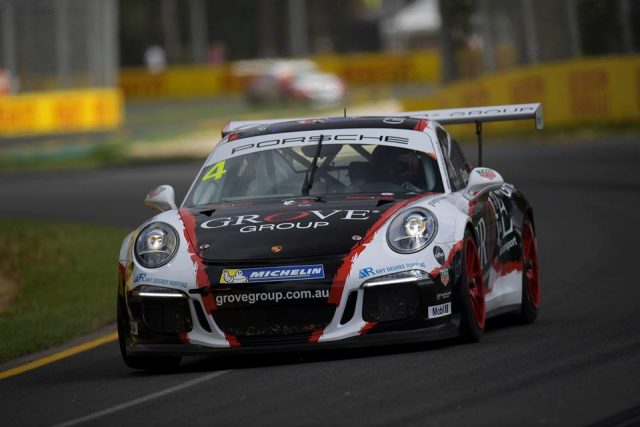
Carrera Cup competitors have expressed their approval of recently announced class and specification changes for the 2018 Australian championship.
Carrera Cup Australia is currently run on an outright basis and also the Carrera Challenge sub-class for non-professional drivers, with all cars running to the same specification.
Stephen Grove, current TAG Heuer Carrera Challenge points leader and 2014 champion, believes that the new class structure will make Carrera Cup more accessible to new drivers, including those stepping up from the feeder GT3 Cup Challenge series.
“I think it’s really good because you’ve obviously got the professionals and they do that for a living, and then you’ve got the Pro/Am,” Grove told Speedcafe.com.
“Most of us guys that do the Pro/Am over the years are semi-professional but we spend a lot of time and a lot of effort.
“To bring an Am class is really good because it brings the new people that can come from GT3 (Cup Challenge) and learn the process.
“As a Pro/Am you’ve got to get out in the car, you’ve got to get on it really quickly, you’ve got to get used to cold tyres, and big crowds at a V8 weekend, so I think it’s a good stepping stone to go from Am and then into Pro/Am.”
Andy McElrea’s McElrea Racing operation fields cars in both classes of Carrera Cup, as well as GT3 Cup Challenge and Australian GT, which is also popular with gentleman drivers.
McElrea agrees with Grove that the split of the non-professional class will relieve the pressure which new drivers face when stepping into Carrera Cup and also providing meaningful competition throughout the field.
“It’s a great thing,” McElrea told Speedcafe.com.
“One of the things that we’ve come to the conclusion of is that a lot of potential Carrera Cup rookies have been stopped by the fact that the front-running Elites are actually much, much quicker than they appear.
“It’s a bit daunting, I think, for a lot of newcomers to think they can hop in and compete with Stephen Grove, Marc Cini, Smollen, Bates, and the guys that have won (Carrera Challenge) in the past.
“I think it’s a fantastic idea so that there’s another level playing field for a different group of guys.”
The two expressed similar reservations about the introduction of ABS to the non-professional ranks, but believe that the move to is a positive overall.
“I was a fan of not having (ABS),” said Grove.
“The reason was because it’s just a pure race car, and if there’s modulating the brake then it takes away the advantage you can or can’t get.
“The one thing it will do is it will bring the front Pro/Am guys to the back of the Pro guys.
“It will bring all the field a lot closer so there’s some advantages and disadvantages; I’m sort of fifty-fifty on it.”
McElrea noted the experience of Matt Campbell, who has graduated to Porsche Supercup by way of a scholarship after dominating the Australian championship in 2016.
Like Grove, McElrea also believes that access to ABS will draw former Carrera Cup competitors back from Australian GT after a recent flight from the one-make category’s non-professional ranks.
“I think it’s a compromise, but I think it’s the absolute best compromise that we could come up with,” he added.
“Matt Campbell has proven that Australian Carrera Cup is a legitimate springboard to an international career but if he had been driving with ABS in Australia here, he would have got eaten alive and wouldn’t have had a chance in that scholarship that he won, or got to Supercars.
“The Pros still need to be able to control and modulate the brake pedal properly, but a lot of the guys that would potentially come back to Carrera Cup from GT racing are used to ABS and like the reassurance, and it should reduce some of the accidents between those guys.”
Porsche has not yet finalised the criteria for the separation of Pro/Am drivers from Am, which will coincide with the Australian racing debut of the new-generation 911 GT3 Cup Car next year.





















Discussion about this post